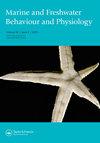饵料大小对青鱼幼鱼餐后代谢反应和运动后代谢恢复过程的影响
IF 0.9
4区 生物学
Q3 MARINE & FRESHWATER BIOLOGY
Marine and Freshwater Behaviour and Physiology
Pub Date : 2018-03-04
DOI:10.1080/10236244.2018.1497427
引用次数: 5
摘要
摘要以青鱼幼鱼(mylophyngodon piceus)为试验对象,研究了饵料大小对其餐后代谢反应和消化对运动后代谢恢复过程的影响。实验鱼被强制饲喂配合饲料(饲料粒度:0.5%、1%和2%体重)。然后测量实验鱼的餐后耗氧量和运动后过量耗氧量(EPOC)。持续时间和耗氧量峰值均随饲料大小的增加而增加。消化鱼的运动后代谢率峰值显著高于禁食鱼,而EPOC幅度和持续时间显著小于或(短)于禁食鱼。这表明:(1)随着饲料量的增加,该鱼通过增加PMR和延长SDA时间来满足消化过程中增加的能量需求;(2)消化鱼可能会降低其厌氧耗尽活性,但会增加运动后的恢复能力。本文章由计算机程序翻译,如有差异,请以英文原文为准。
The effects of meal size on postprandial metabolic response and post-exercise metabolic recovery process in juvenile black carp (Mylopharyngodon piceus)
ABSTRACT The effects of meal size on the postprandial metabolic response and of digestion on the post-exercise metabolic recovery process were investigated in juvenile black carp (Mylopharyngodon piceus) . Experimental fish were forcedly fed with compound feed (meal sizes: 0.5%, 1% and 2% body weight). Then, the postprandial oxygen consumption rate and excess post-exercise oxygen consumption (EPOC) of the experimental fish were measured. Both the duration and the peak of oxygen consumption rate (PMR) increased with increasing meal size. The peak post-exercise metabolic rate of digesting fish were significantly higher, whereas EPOC magnitude and its duration were significantly smaller or (shorter) than those in the fasting fish. It is suggested that (1) this fish fulfills the increased energy demand during the digestive process by increasing PMR and by prolonging SDA duration with increasing meal size and (2) digesting fish might decrease their anaerobic exhaustive activity but increase the post-exercise recovery capacity.
求助全文
通过发布文献求助,成功后即可免费获取论文全文。
去求助
来源期刊

Marine and Freshwater Behaviour and Physiology
生物-海洋与淡水生物学
CiteScore
2.10
自引率
0.00%
发文量
9
审稿时长
>12 weeks
期刊介绍:
Marine and Freshwater Behaviour and Physiology is devoted to the publication of papers covering field and laboratory research into all aspects of the behaviour and physiology of all marine and freshwater animals within the contexts of ecology, evolution and conservation.
As the living resources of the world’s oceans, rivers and lakes are attracting increasing attention as food sources for humans and for their role in global ecology, the journal will also publish the results of research in the areas of fisheries biology and technology where the behaviour and physiology described have clear links to the contexts mentioned above.
The journal will accept for publication Research Articles, Reviews, Rapid Communications and Technical Notes (see Instructions for authors for details). In addition, Editorials, Opinions and Book Reviews (invited and suggested) will also occasionally be published. Suggestions to the Editor-In-Chief for Special Issues are encouraged and will be considered on an ad hoc basis.
With the goal of supporting early career researchers, the journal particularly invites submissions from graduate students and post-doctoral researchers. In addition to recognising the time constraints and logistical limitations their research often faces, and their particular need for a prompt review process, accepted articles by such researchers will be given prominence within the journal (see Instructions for authors for details).
 求助内容:
求助内容: 应助结果提醒方式:
应助结果提醒方式:


